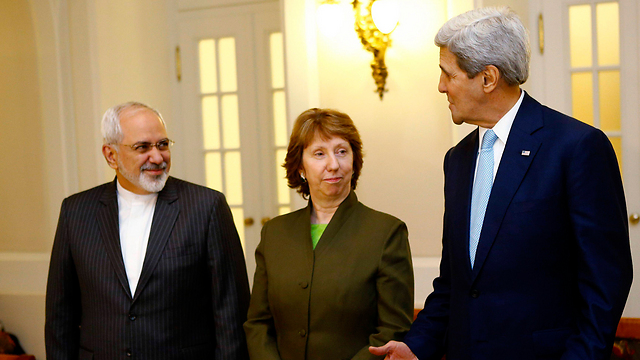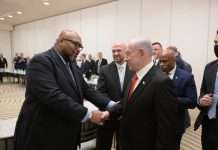Will the six world powers and Iran clinch a deal?
Friday, 26 June 2015
Dr. Majid Rafizadeh/Al Arabiya
After years of negotiations, the Islamic Republic and the six world powers, known as the P5+1; China, France, Russia, the United Kingdom and the United States plus Germany, are only a few days away from the June 30 deadline to seal a final nuclear deal.
The critical question to address is whether the six world powers and the Islamic Republic will reach a so-called historic deal. Since the time that the nuclear issue emerged, and since Iran’s clandestine nuclear sites in Arak and Natanz were disclosed, the result of the nuclear talks between the P5+1 and Iran have always been one of the most unpredictable landscapes in geopolitics.
This is due to the fact that a crucial underlying characteristic of the Iranian political system is unpredictability. There exists an unprecedented level of tactical convergence and shared interest between the Obama administration and Iran
Nevertheless, I would argue that these rounds of nuclear talks appear to be different from the former negotiations between the P5+1 and the Islamic Republic. In other words, the odds of reaching a final nuclear agreement are high. Although both parties will most likely miss the June 30 deadline, nevertheless, they can still seal a deal by extending the talks. This is similar to other several extensions that were made and then resulted in deals, such as the recent interim one, or agreed frameworks in the past two years.
Why are the odds of sealing a final nuclear deal high?
While extending the talks is very likely, there are several other key factors that suggest why it is likely that the six world powers and the Islamic Republic will ultimately reach a final nuclear deal.
First of all, it is crucial to point out that reaching a final nuclear is more of a political decision (not merely a technical nuclear decision), which has to be made in the White House and in the office of Supreme Leader Ayatollah Ali Khamenei. The two key players in the nuclear talks are the United States and the Islamic Republic.
There exists an unprecedented level of tactical convergence and shared interest between the Obama administration and Iran which suggests rapprochement. Both sides have found each other on the same side, fighting ISIS. Both sides share the same geopolitical, national, security, economic and strategic interests in preserving the power of the Iraqi government. In addition, Washington and Tehran are on the same page when it comes to fighting extremist groups in Syria.
This tactical convergence between Tehran and Washington is critical in pushing both governments towards reaching a nuclear deal.
Secondly, as U.S. Presidential campaigns have began, and as President Obama will be leaving office in less than two years having spent a significant amount of political capital in nuclear talks, he needs this deal for his legacy. From, his perspective, reaching a deal will distinguish him from other U.S. presidents significantly. In other words, he does not desire to leave the office with a legacy of failing to reach a nuclear deal.
The deal is a no-brainer for Ayatollah Khamenei
From Ayatollah Khamenei’s perspective, sealing a final nuclear deal is a no-brainer, economically speaking. A decade ago, Khamenei’s calculations were different from the ones he currently holds. The Islamic Republic has been spending billions of dollars in ensuring Assad’s hold-on-power, securing the power of the Shiite ruling coalition in Iraq, and funding and arming Shiite groups across the region. With the economic sanctions that Tehran is enduring and with the fall of oil process, the supreme leader is in need of the nuclear deal more than ever before.
In other words, for the supreme leader, economic gains justify political actions to reaching a nuclear deal. In addition, although he appears to give incendiary speeches with regards to the nuclear talks and although he seems to be inflexible and strict, the latest leaked information from the Iranian parliament suggest that Khamenei is indeed in favor of the final nuclear deal and he seems to be instructing Rowhani’s nuclear negotiating team to be flexible in order to seal a deal. A recent piece of legislation in Iran’s parliament also eliminated the power of Iranian lawmakers to supervise the nuclear deal. The right of supervision formally goes into the hands of the country’s Supreme National Security Council (SNSC).
In addition, for Khamenei, the deal will only subject Iran to a short period of restrictions, but will provide Iran with a significant economic boost and legitimacy. Also, Iran will not dismantle its nuclear sites and will be capable of working on its nuclear program with full speed after the nuclear deal expires.
Finally, Iranian hardliners, particularly the high officials of Iran’s Revolutionary Guard Corps, have witnessed that the nuclear talks and the possibility of a nuclear deal have already made President Obama more lenient with Iran, and ignoring Iran’s military (IRGC and Quds Force) intervention and aggressiveness in the region. Although a recent annual terrorism report by the State Department shows the aggressive foreign policy of the Islamic Republic and although it found that even under the presidency of Hassan Rowhani, “Iran continued to provide arms, financing, training, and the facilitation of primary Iraq Shiite and Afghan fighters to support the Assad regime’s brutal crackdown… Iran remained unwilling to bring to justice senior al-Qaeda members it continued to detain and refused to publicly identify those senior members in its custody.” President Obama has still been unwilling to criticize or pressure Iran due to the possibility that a nuclear deal can be reached.
These factors – including the significant tactical convergence between Tehran and Washington, Obama’s search for legacy, and Ayatollah Khamenei’s tactical shift for economic gains – suggest that the odds for sealing a final nuclear is very high this time around.




















